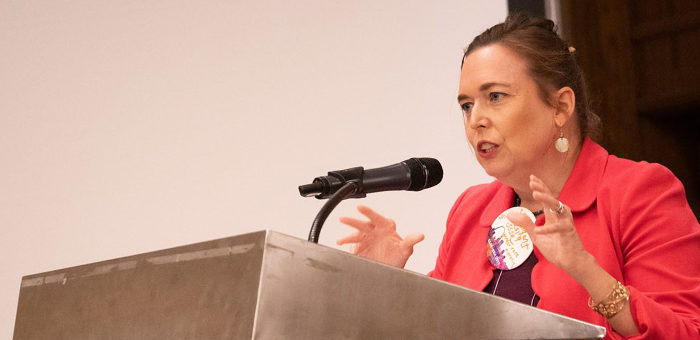Are religion and science in conflict? How do different religious groups view science? Do evangelicals perceive tension between science and their faith? Elaine Howard Ecklund studies religious people’s perceptions of science and lends us her expertise.
In Today’s Conversation with NAE President Leith Anderson, you’ll hear a noted sociologist share findings from her research of over 10,000 Americans and explain:
- The fundamental questions that shape how Americans approach science;
- What people of faith — particularly evangelicals — believe about the Earth’s origin;
- What informs attitudes towards the environment and climate change; and
- How religious groups view scientists.
Read a Portion of the Transcript
Leith: It seems that there’s a pretty substantial and ongoing myth that religious people just don’t like science. To me, it seems that what I have most often heard is that that’s attributed either to the Scopes trial in 1925 or somebody’s got a story about a high school science teacher or college professor and somehow that anecdote takes on a whole expansive life of its own. Where did these myths get started?
Elaine: I think a quick answer is that conflict sells, so a radical collaboration doesn’t sell as well. But I think that we need to persist. In its best form, social scientific research can help us come more humbly to these kinds of conflicts and say, “Gosh, there’s some stereotypes that this group has about this other group. If we could use research to break down those stereotypes we might be able to work together for the common good a little more effectively.”
It does seem like these historical cases that particular kinds of media report what we call “over-generalization from a few loud voices,” meaning that people who write popular books — people who are likely to be quoted who are especially angry — make the rest of the world believe that the group of people who think there’s a conflict is much larger than it really is. Those are some of the things, I think, that lead us to the place of conflict. For me as a researcher and those of us who work in pastoral ministry or have other kinds of public roles, I think that makes our job especially more challenging, but there is a lot of potential there when we see this data that people are ready to receive a different story and a truer story.
When God and Science Meet
Many people perceive tension — and sometimes even hostility — between faith and science. But there’s more agreement than many realize. The NAE’s “When God and Science Meet” publication brings together an impressive group of authors to put science and faith on the same page. Podcast listeners can receive a free printed copy by using a promo code included in the podcast audio.
Order Now
Share the Love
If you enjoyed the program, please rate it on iTunes and write a brief review. That will help get the word out and raise the visibility of the show.
Elaine Howard Ecklund is the Herbert S. Autrey Chair in Social Sciences, professor of sociology, and founding director of The Religion and Public Life Program at Rice University, where she is also a Rice Scholar at the Baker Institute for Public Policy. One of her main research interests is the intersection of science and religion. Howard Ecklund has authored dozens of research articles and four books, including “Religion Vs. Science: What Religious People Really Think.” She holds a B.S., M.A. and Ph.D. from Cornell University, and was a visiting graduate student fellow at Princeton University.
Leith Anderson is president emeritus of the National Association of Evangelicals and pastor emeritus of Wooddale Church in Eden Prairie, Minnesota. He served as NAE president from 2007–2019, after twice serving as interim president. He served as senior pastor of Wooddale Church for 35 years before retiring in 2011. He has been published in many periodicals and has written over 20 books. Anderson has a Doctor of Ministry degree from Fuller Theological Seminary, and is a graduate of Moody Bible Institute, Bradley University and Denver Seminary.




 View All Podcasts
View All Podcasts 










